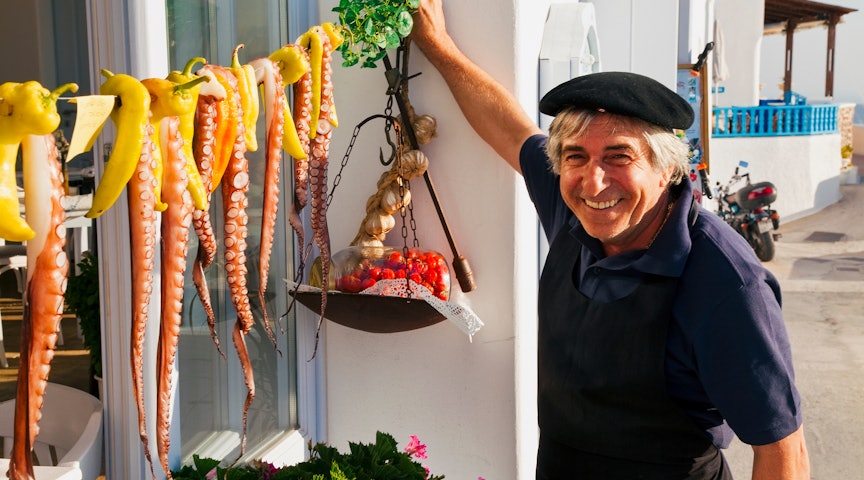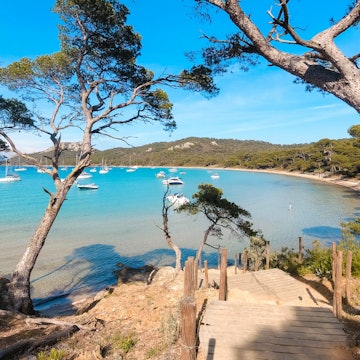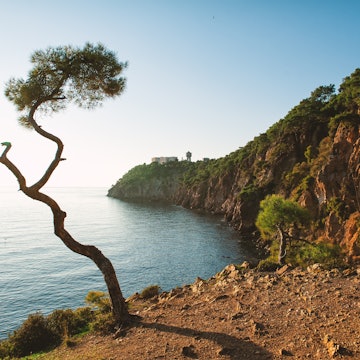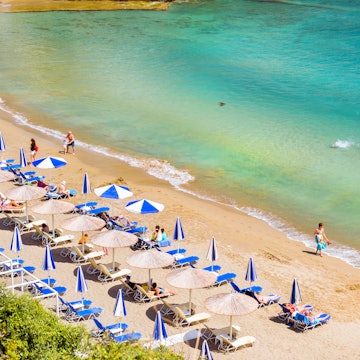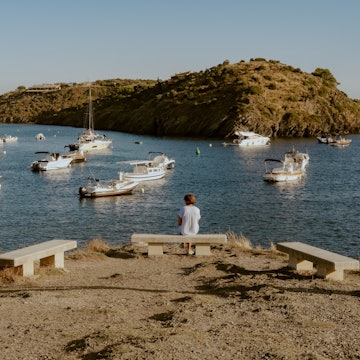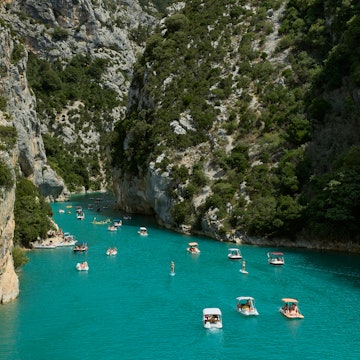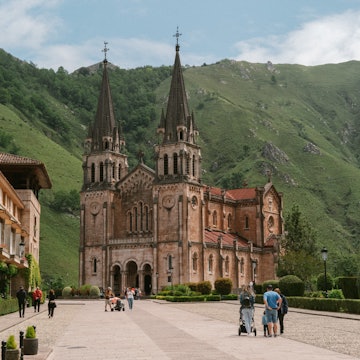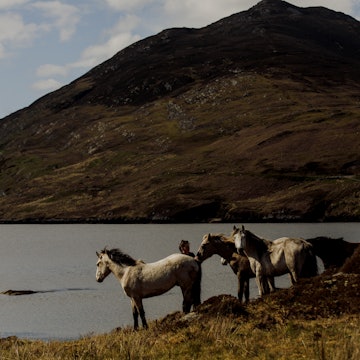

Mykonos' windmills above the harbor. Izabela23/Shutterstock
Mykonos is the party animal of the Cyclades, Greece's answer to Ibiza, with sunseekers flocking to beach clubs by day and bass lines pounding through superclubs until dawn. But there’s more to Mykonos than dazzling sand and insatiable revelers.
Spend a little time on Mykonos to discover the quiet charm of the Cycladic maze of Mykonos Hora, the pleasure of traveling the backcountry roads and a dining scene to rival the other Greek islands. Let this guide to Mykonos lead the way.
When should I go to Mykonos?
Peak tourism season in Mykonos is June to September, so hotel prices are at their highest and beaches, restaurants and nightclubs are packed. Summer is party time, with free concerts and events taking place as part of the summer-long Culture Festival, not to mention Xlsior in August, a 5-day clubbing festival that attracts some 30,000 LGBTQ+ revelers. The shoulder seasons (April to early June, late September and October) are arguably a more pleasant time to visit Greece and its islands. You get the best beaches minus the crowds, plus lower accommodation prices.
In winter, it may be too cold for sunbathing and swimming, but bonuses include empty beaches and plenty of bargain accommodations. Many Mykonos residents rent out their houses in summer and return during the low season, so lots of restaurants stay open year-round. However, winter can bring fierce storms, and ferries to other Greek islands are limited.

How much time should I spend in Mykonos?
Ideally, you take about 4 days on the island as part of a longer itinerary, but you could enjoy Mykonos in 2. Spend the first day on a beach, then explore the shops, restaurants and bars of Little Venice in the late afternoon; on the second day, catch a boat to the sacred island of Delos. With a few extra days you can search out some of Mykonos' further flung and less crowded beaches, such as Agios Sostis.
Is it easy to get in and around Mykonos?
Throughout the year, frequent ferries connect Mykonos with Athens’ ports of Rafina and Piraeus, as well as the neighboring islands of Tinos, Serifos and Andros. In high season, high-speed catamarans link Mykonos with numerous other Cycladic islands, including Santorini and Paros. Check OpenSeas for timetables. Mykonos' airport has year-round flights to Athens and Thessaloniki, as well as to European destinations during high and shoulder seasons. It’s easy to rent a car, moped or ATV from one of Mykonos’ many rental companies, and bus services around the island are reasonably frequent.
Public buses between Mykonos Hora, the New Port (2km north of Mykonos Hora, where ferries dock), the airport and south coast beaches run regularly all summer and are the best way to get around the island. They serve almost every beach, and one-way fares are €1.50–2.50. Beaches can also be reached with a 2WD rental car. Except for the main road along the island's spine, access roads to the beaches can be extremely narrow. You won't find rideshares like Uber here, but taxis are plentiful. The most fun way to get around is by boat, and reasonably priced water taxis run between the New and Old Ports as well as the major southern beaches. You can get an all-day water taxi pass for €20.

Lonely planet’s trusted travel insurance provider
Travel with confidence. Protect your trip and your wallet.
We don’t represent World Nomads, we receive a fee from quotes using this link. This is not a recommendation to buy travel insurance.
Top things to do in Mykonos

Enjoy the sunshine on Mykonos' best beaches
Whether you’re looking for a tiny cove lapped by cerulean water or a wide stretch of white sand covered with sun worshippers, Mykonos has a beach to suit your needs. The island counts 25 beaches, and they’re justifiably Mykonos' biggest natural attraction. Partygoers should look no further than Paradise or Super Paradise, dominated by their eponymous beach clubs. Paraga and Psarou are other favorites for beach parties. Popular with families, Elia is Mykonos’ longest sweep of white sand, while Platys Gialos and Kalafatis are particularly good for water sports.
On the north coast, Panormos and Agios Sostis receive a fraction of visitors compared to the southern beaches and have naturist-friendly sections. Pebbled Myrsine and Fokos coves, reachable via rutted tracks off the northeast coast, offer seclusion and refuge from the crowds. In the southwest, Ornos bustles with dozens of seafront restaurants, while secluded Agios Ioannis is a good spot for windsurfing.
Tour the island by bicycle
Mykonos has a hilly interior, quiet backcountry roads, tranquil villages and several practically deserted beaches along the north coast. Yummy Pedals tailors guided mountain-biking tours of the island to suit your skill level.
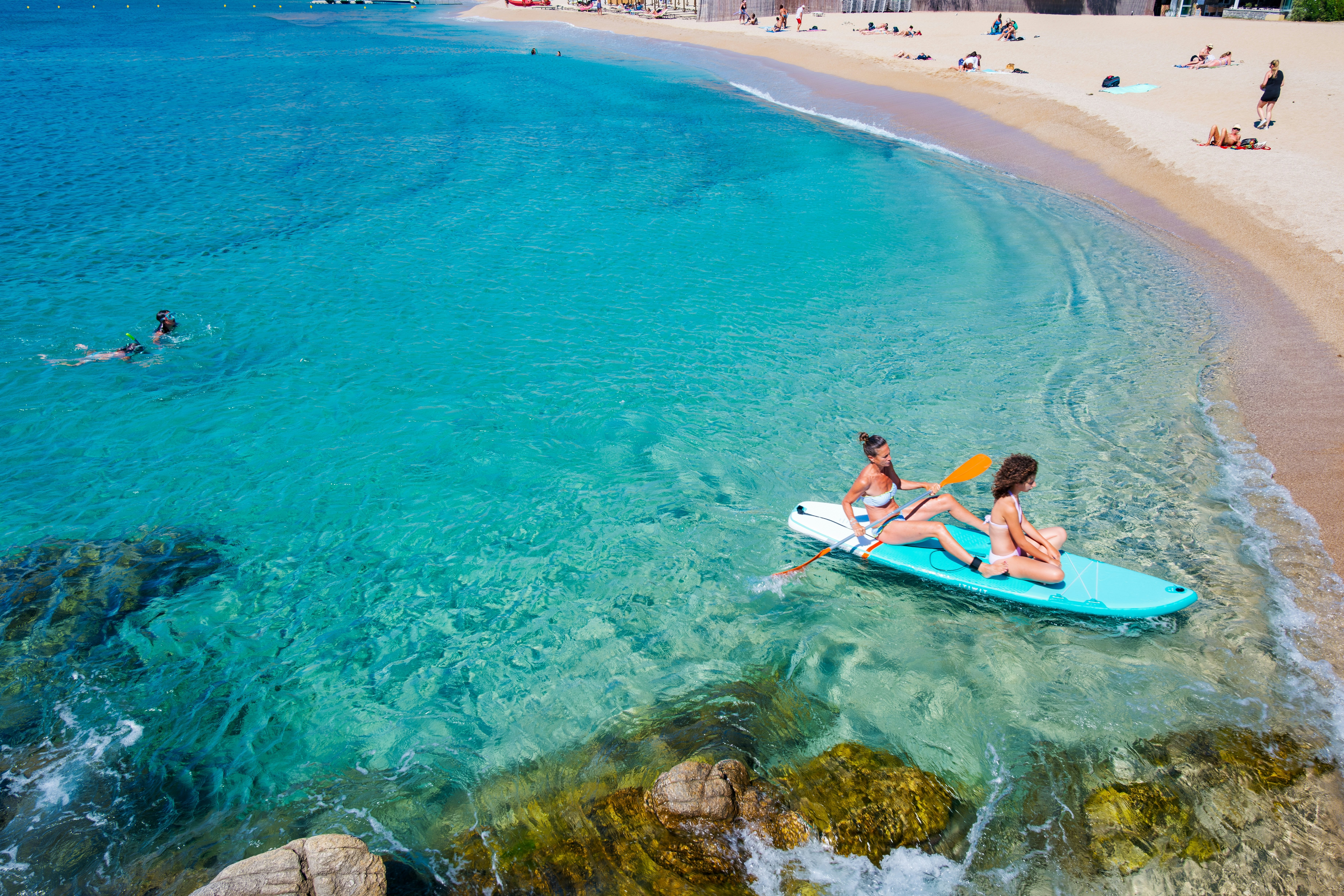
Take to the water for a swim, dive or water sports
Mykonos doesn’t lack places to take a plunge, from infinity pools at top hotels and private plunge pools to the 25 beautiful sandy beaches that fringe the island.
For a more adrenaline-packed experience, head to Windsurfing Mykonos on Kalafati Beach for lessons, or try out fly boarding, wakeboarding or wake skating with Elia Watersports on the namesake beach.
Plenty of walls, caves and wrecks entice beginner and advanced divers alike. Diving operators are based on Paradise Beach, Lia Beach and Kalafatis Beach. The most reputable outfits include Mykonos Diving Center and GoDive Mykonos.
Visit the island's historic sites
Mykonos is the gateway to the sacred island of Delos, the mythical birthplace of Apollo and Aphrodite, a UNESCO World Heritage site and one of the most important and well-preserved archaeological sites in Greece. Daily boat trips depart from the pier in Mykonos Hora.

Watch the sunset
Prime spots for watching the greatest free show on earth include the bars of Little Venice in Mykonos Hora, Kato Mili (a classic quartet of windmills on a hillock overlooking Little Venice) and Agios Ioannis beach.
Then stay out until dawn
Mykonos is party central from May to October. The scene reaches its crescendo in July and August, when it can feel like a global convention of the louche. Some beach clubs go late into the night, especially at Paradise Beach. However, nightlife is really centred on Hora. It all kicks off at sunset, when the bars in Little Venice get packed. After the glow’s gone, people move to bars that dot the whitewashed streets. Often a modest entrance hides an opulent interior. After 11pm, it is on to the clubs – some huge – that are sequestered off the lanes. Mykonos is a major stop on the global circuit of A-list DJs.

My favorite thing to do in Mykonos
Explore the tiny capital, Mykonos Hora. It's Mykonos’ second-biggest attraction after its beaches. You can lose yourself for hours in the enchanting warren of narrow pedestrian streets bedecked with bougainvillea and lined with picture-perfect churches, restaurants and boutiques. The Archaeological Museum of Mykonos is well worth your while, as is the informative Aegean Maritime Museum.
The shopping in Mykonos is excellent. For art, check out Mavrogenous Street, lined with shops of Greek designers, while Little Venice is great for casual fashion, jewelry and souvenirs. Mykonos Hora’s other delights include an appealing open-air cinema, Cine Manto, and a smattering of quirky art galleries, such as Rarity Gallery and Art and Soul. The island’s hilly interior is dotted with small traditional villages, quite a contrast to the merry bustle of the coast. Swing by the only other settlement of any size in Mykonos, Ano Mera, and have a look at its whitewashed Tourliani Monastery, just off the taverna-lined main square.
How much money do I need for Mykonos?
Mykonos is one of the most expensive Greek islands, particularly when it comes to food, alcohol and accommodations. You can keep costs down by avoiding beach clubs and dining at local markets. Keep an eye out for early afternoon lunch deals at low-key tavernas. Stock up on fresh tomatoes, feta, eggplant, zucchini, watermelon, peaches, nectarines and cherries at mini markets and cook at home. If you travel during the low season, you'll see a significant decrease in accommodation costs.
Night in a midrange hotel: €80–150 during low season; €180–300 in summer
Night in a contemporary hostel: €30–90
Beach club admission: from €25
Dinner: €22–40
Casual lunch: €10
Coffee: €3
Cocktail: €16–25
Bottle of local wine: €8–10 in a supermarket; €12 for house wine in a restaurant
Bottle of beer: €1–3 in a supermarket; €5 in a bar
Taxi from the airport: €15–20 to Fabrika Sq in Mykonos Hora
Take your Greece trip with Lonely Planet Journeys
Time to book that trip to Greece
Lonely Planet Journeys takes you there with fully customizable trips to top destinations – all crafted by our local experts.
